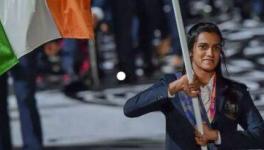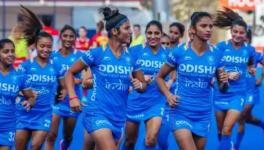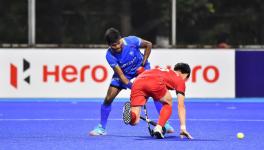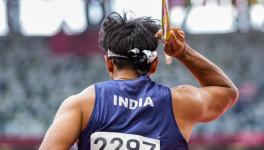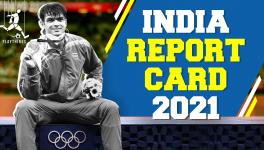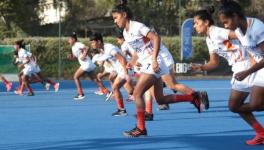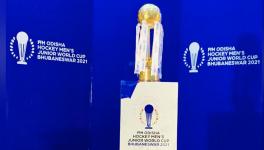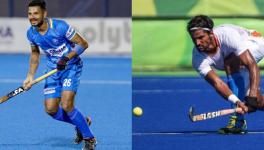Ranked Favourites But Tricky Gold Quest for Indian Hockey Teams at Asian Games
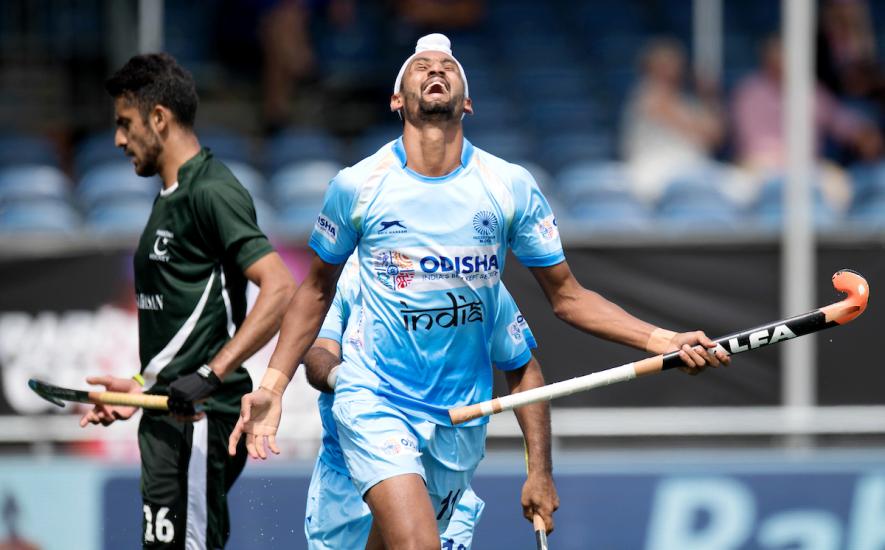
At the Asian level, India, ranked 5th in the world, are overwhelming favourites, having beaten their closest rivals Pakistan 4-0 at the Champions Trophy in their last meeting (Pic: Hockey India)
Insofar as a team can be overwhelming favourites at an international sports event, the Indian hockey team is that at the Asian Games in Jakarta. India are ranked fifth in the world, seven places above the next highest team from Asia -- Malaysia. Pakistan and South Korea follow in 12th and 13th places. Gold, far from being an expectation, is a compulsion, especially since an Olympic qualifying berth are at stake as well.
But results are not based on rankings, and games are not played on paper. In elite sport, the margins are razor thin. The last time India played Malaysia, it was during the Commonwealth Games (CWG) in Gold Coast, in their penultimate group game. They won 2-1 in a largely underwhelming performance peppered with missed chances and highly erratic play. The game before that was another tightly contested match, the Asia Cup final which India edged 2-1 (admittedly the quality of the encounter was electric; India’s 6-2 win over the Malaysians in an earlier group encounter contributing no doubt).
The last six times India have played Pakistan the goal ratio is a scarcely believable 26-5 in favour of India (Pakistan have salvaged one draw, a 2-2 at the CWG in Gold Coast).
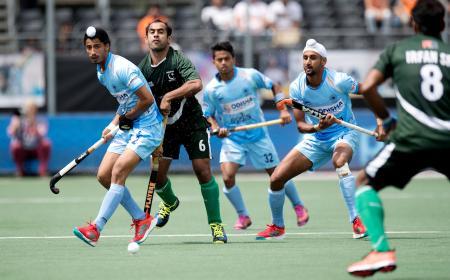
Youngsters like Dilpreet Singh (left) have provided a fresh impetus in India's midfield, and balanced with the experience of players like Sardar, makes them formidable opposition.
It has been a strange year for Indian hockey. They missed out on a completely winnable medal at the Commonwealth Games, and won a not wholly expected consecutive silver at the Champions Trophy in the Netherlands. These two contrasting results came within the space of three months. Between them was squashed the hiring, rejigging, rehiring, rejigging and settling of two coaches who are, probably, by now, suffering motion sickness of the appointment kind.
Also Read | Golden Freedom: Legacy of Independent India’s First Hockey Olympic Gold in 1948
At the Commonwealth Games, Sjoerd Marijne was in charge of the men’s team, appointed in September of 2017, in Hockey India’s annual festival of turmoil. Marijne was the coach of the women’s national team when he was picked out and put in charge of the men. It was an absurd appointment, made only more absurd by who they put in charge of the women’s team -- Harendra Singh, the junior men’s team coach who had won the Junior World Cup in late 2016.
Harendra had publicly admitted to craving the senior men’s job, and so Hockey India gave him the women’s job. If you feel the faintest hint of a migraine, perhaps now you should give that aspirin a go. It only gets weirder from here.
Marijne was a highly unsuitable appointment. Everyone agreed.
“There is a massive difference in coaching the men’s team and the women,” says V Baskaran, the captain of the 1980 Olympic gold-winning team in Moscow. Baskaran has had multiple stints as coach of the men’s team and was the head coach with Harendra as his assistant at the Sydney Olympics in 2000.
Also Read | Mind Over Drop Shots: PV Sindhu’s Real Challenge Beyond Carolina Marin
“There is no need to feel aggrieved at admitting this. The style of play is different, the movement is different. In fact the way that you organise the team for the men and the women is also different,” he adds, “I was not wholly supportive of the appointment, then, and I am not sure why it was made, now.”
Post the Commonwealth Games debacle, Marijne was installed back in the women’s camp, and Harendra in the men’s. The results -- in both teams -- have vindicated the move. India finished with a silver medal at the Champions Trophy under Harendra, and reached the quarterfinals of the FIH Women’s World Cup under Marijne.
While the women’s team’s job is significantly tougher than the men’s, a medal will still be a basic demand. They are the highest ranked nation in the tournament -- pipping South Korea and China thanks to World Cup points -- but will face tough competition from the two in the contest for the medals. They have experience though, and have been unbeaten against Asian opposition since last year.
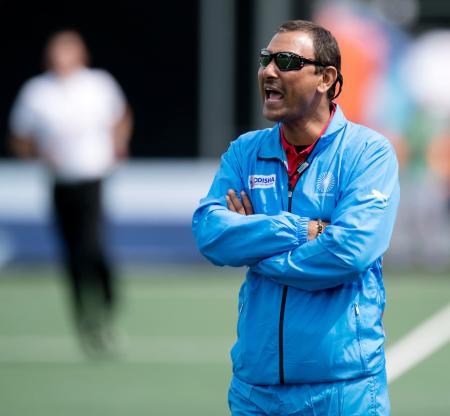
Harendra's appointment has seen a dramatic upswing in the team's fortunes, largely because of the chemistry he shares with a large portion of the squad, from their junior days. (Pic: Hockey India)
Harendra’s job, while relatively simpler on paper, is significantly tougher in reality. The ‘favourites’ tag has never helped India and the unpredictability of Pakistan and tactical nous of Malaysia cannot be discounted.
“It is all well and good to call us favourites, but the correct approach is to go game by game obviously,” says former India captain and Olympian Arjun Halappa.
Also Read | Football’s Top Leagues More Predictable Now, But What’s The Cost?
“The team has a lot of youth, a lot of new faces who will be blooded and will enjoy the experience. Harendra is also the correct kind of coach for this set of players. He has that unbridled passion as well as a smart tactical mind now, having been in the sport for so many years,” adds Halappa, “He is the first Indian coach for the team in a while now, and while I don’t want to overplay the language barrier idea, it is true that he understands Indian hockey better. What the players want, how they want to play, what their comfort zone is…”
Baskaran agrees with the fact that Harendra’s personal growth as a coach has been nothing short of incredible. “He has to be commended for that. Even when he was an assistant coach, he was always good with players, managing and talking, but now he has also understood that in-game management is necessary and the game has to be constantly evolving.”
One of the most noticeable things about the Commonwealth Games squad was the fresh new faces that was in the team. Marijne’s approach of blooding youngsters was commendable, but perhaps also misguided, especially because he lacked strong, experienced hands on the tiller.
Manpreet Singh became indispensable in midfield, and every time he exited the field, India were bereft of possession. Harendra was expected to continue with this youth programme, but he has recalled some older faces in the hope of providing some balance.
“The benefit that this team will have, in my opinion, is the availability of older players in big matches,” Halappa says. “There are a lot of young players in the team now, guys who have obviously graduated from the World Cup winning junior team, but with guys like Sardar and Rupinder [Pal Singh] back in the side, it will help.”
Also Read | In Hima Das’ Triumph, a Caution for Indian Sports Administrators
Sardar Singh’s return will be, undoubtedly, one of the more hyped moments for the squad. At 32, his best years may be behind him, but his fitness and ball distribution may not have diminished much. As Halappa says, “He may not be capable of playing brilliant throughout the game like his younger days, but he will definitely have decisive moments, and that’s all you need from him.”
Additionally, with the years behind him, and youngsters like Vivek Sagar Prasad vying for his position (not to forget that Manpreet Singh, the captain, is his direct replacement) this may be one of the final times we see Sardar in the India blue. A gold would be a graceful exit.
Get the latest reports & analysis with people's perspective on Protests, movements & deep analytical videos, discussions of the current affairs in your Telegram app. Subscribe to NewsClick's Telegram channel & get Real-Time updates on stories, as they get published on our website.









